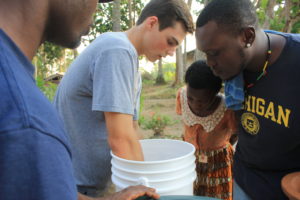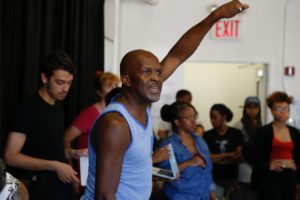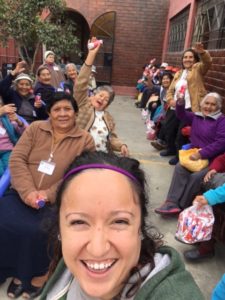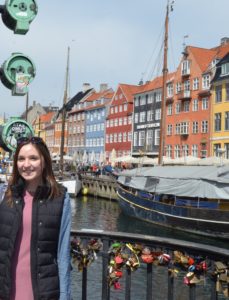From rural America to a remote village in Africa, and places in between, many University of Michigan students spent the summer months immersed in research, education and service.
Five students from the School of Music Theatre & Dance, the Stamps School, Michigan Engineering, School of Information and School of Social Work shared their engaged learning experiences that included teaching locals about water filtration and technology, and learning about the culture and life experiences of people quite different from themselves.
Ian Crowley, a Stamps School of Art & Design senior focused on sustainable design and community engagement, has traveled to Gabon, in Africa, two summers in a row to help locals in one village.
He and three other students from the school, with faculty member Joe Trumpey, delivered ceramic water filters and taught a group of students and some of the area residents how to use them.

Ian Crowley demonstrates how to assemble ceramic water filters.
One of the lessons Crowley took away from the experience is the role of outsiders in lending a hand.
“Being able to serve people is something I find really fulfilling,” he said. “But, also kind of taking a step back and realizing you are in someone else’s home, in somebody else’s country, trying to figure out what the best way to serve them is, or if they even want you there. So these are really difficult and interesting things to consider when you are doing this kind of work.
“One of the big things that I’ve learned about this is that I absolutely need to be working with other people. I’m really interested in design but not necessarily clean cut product design. I’m interested in design that is going to help people in their daily lives.”
School of Information doctoral student Chanda Phelan dedicated her summer to helping rural libraries and community groups bring technology solutions and advances to residents. In her custom-made Techmobile, Phelan visited several locations in Montana and Wyoming to offer citizens help with technical challenges and give young people a chance to explore the latest technology.
Phelan refurbished a 1986 13′ Scamp camping trailer, purchased on Craigslist, and painted it electric blue with a gray circuit board pattern.

Chanda Phelan drove her techmobile to rural communities to share technology solutions and advances. Photo by Charlie Denison, Lewistown News-Argus.
She brought along a 3D printer, Google Cardboard VR goggles, Maker materials such as Makey-Makeys and a snap-circuit board, and Raspberry Pi materials (small computers for learning programing) to create projects like a security camera system and weather station.
Phelan grew up in rural Ohio and has focused her research on the tech needs of people in small communities.
Johnny Mathews, III spent the summer working in the administrative office of Urban Bush Women in New York City. The School of Music, Theatre & Dance student, who is a dance major and performing arts management minor, said the work helped him understand all that goes on behind the scenes of a major production.
His responsibilities included organizing many of the details for participants in the organization’s Summer Leadership Institute, which culminated with performances held at New York University. Mathews also got to participate in the institute.
The arts organization uses dance to share “the untold and under-told histories and stories of disenfranchised people,” according to its website. A large part of the institute was dedicated to talking about race and the arts.

Johnny Mathews, III, (left) takes part in the Summer Leadership Institute with the Urban Bush Women dance organization. Photo by Tanya Williams, UBW.
“This experience made me think about how inaccessible art is for disenfranchised people, whether it be due to cost or content, we need to continue to work towards making art an experience for all,” Mathews said.
“By being immersed in the administrative team for most of my internship and then being involved in the Summer Leadership Institute with current and past members of the company, I was able to witness first hand Urban Bush Women’s commitment to sharing the stories of peoples in the African Diaspora and to engage with their community. Through discussion about people’s identities, I better understand and recognize my identities and have gained some new tools to better express those identities in my art making.”
Madel Leal, master’s student in the School of Social Work, focused on community organization and social systems, has been involved with many programs involving young people. So when she went to work at Los Martincitos Senior Services Center on the outskirts of Lima, Peru, it was a step outside of her comfort zone. But it was not long before apprehension gave way to comfort and an appreciation for the people she called abuelitos (little grandparents).
“So to be able to be in that space, to be able to co-live with them for that 13 weeks was a really awesome experience,” Leal said.

Madel Leal spent the summer at a senior center in Peru, working with abuelitos (little grandparents).
She spent much of her time serving the elderly meals, and helping with activities like jewelry making, dancing and playing games.
“Tuesdays and Thursdays we’d get to do home visits, and so I’d get a holistic view of community members. Most of them live in extreme poverty and a lot of them live by themselves.”
The daughter of immigrant parents, Leal always wanted to experience Latin America firsthand. The chance to go abroad created an opportunity to sharpen her speaking skills and immerse herself in a culture that was familiar yet still held a lot of mystery.
“I am passionate about global social work. I learned a lot about myself, a lot about other populations, and I learned a lot about the resiliency that these people have.”
Like Leal, Maria Roma, Michigan Engineering student, stepped out of her comfort zone this summer in an Undergraduate Research Program at Lund University in Sweden. Roma’s project was to help design a mobile application that would help stroke patients working on rehabilitating their hands use mobile devices.
She had never developed an app before and said it was a great experience learning technical skills. But Roma said some of the biggest lessons had to do with the role of engineers in Swedish society and the culture of the country.
“It was a new experience for me. In some ways, it was a chance to learn how to define myself outside of my normal context,” she said.
Roma said she began to think about things like why grocery stores are designed the way they are, and why people in the United States drive everywhere. Like many in Sweden she rode a bike to work.

Roma in Sweden where she worked on an app for stroke patients.
“I also learned more about politics from the citizen’s level by having conversations with people my age in Sweden (and from other European countries).
“I think that my favorite memory from being abroad was probably the first moment that I stepped foot into my apartment. I am very serious when I say that Sweden sometimes looks like IKEA threw up all over a country: my apartment was entirely white, all from IKEA.
“In some ways, that perfectly summed up how I felt: this was an entirely blank room and the start of an entirely new experience,” she said. “It was the best possible mix of terrified and excited.”
Roma blogged about her experience.


